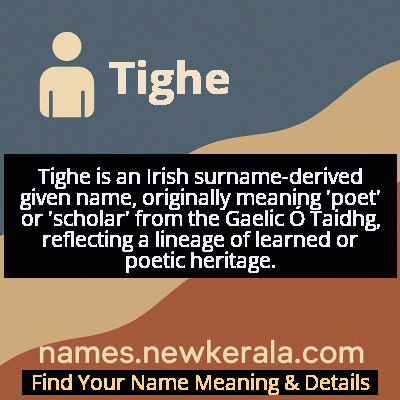Tighe Name Meaning & Details
Origin, Popularity, Numerology Analysis & Name Meaning of Tighe
Discover the origin, meaning, and cultural significance of the name TIGHE. Delve into its historical roots and explore the lasting impact it has had on communities and traditions.
Name
Tighe
Gender
Male
Origin
Irish
Lucky Number
4
Meaning of the Name - Tighe
Tighe is an Irish surname-derived given name, originally meaning 'poet' or 'scholar' from the Gaelic Ó Taidhg, reflecting a lineage of learned or poetic heritage.
Tighe - Complete Numerology Analysis
Your Numerology Number
Based on Pythagorean Numerology System
Ruling Planet
Uranus (Rahu)
Positive Nature
Strong sense of order, loyal, practical, and disciplined.
Negative Traits
Stubborn, overly serious, rigid, and prone to feeling restricted.
Lucky Colours
Blue, gray.
Lucky Days
Saturday.
Lucky Stones
Blue sapphire.
Harmony Numbers
1, 7, 8.
Best Suited Professions
Managers, engineers, accountants, organizers.
What People Like About You
Dependability, discipline, practicality.
Famous People Named Tighe
Tighe O'Donoghue-Ross
Artist
Renowned Irish sculptor and painter known for his Celtic-inspired works and public art installations
Tighe Barry
Activist
Prominent American peace activist and member of the anti-war group Code Pink
Tighe Sullivan
Business Executive
Financial services executive and former chairman of the New York Stock Exchange's board of directors
Name Variations & International Equivalents
Click on blue names to explore their detailed meanings. Gray names with will be available soon.
Cultural & Historical Significance
In Irish folklore and mythology, characters named Tadhg often appeared as wise figures or skilled storytellers, reinforcing the name's intellectual connotations. The name's journey from ancient Gaelic Tadhg to modern Tighe reflects the broader story of Irish cultural survival and transformation. During the Irish diaspora, the name traveled with emigrants to North America, Australia, and elsewhere, serving as a tangible link to homeland and heritage. Today, Tighe represents not just an individual identity but a connection to centuries of Irish history, literature, and cultural values. It stands as evidence of how traditional names can adapt while maintaining their essential character and meaning across generations and continents.
Extended Personality Analysis
Individuals named Tighe typically exhibit a distinctive blend of intellectual depth and social grace that reflects the name's historical meaning of 'poet' or 'philosopher.' They often possess strong analytical abilities combined with creative thinking, making them effective problem-solvers who can approach challenges from multiple perspectives. Many Tighes demonstrate natural leadership qualities tempered with empathy, allowing them to connect with diverse groups while maintaining authority and respect. Their communication skills are frequently noted as exceptional, whether in formal presentations or casual conversations, and they often have a particular talent for explaining complex ideas in accessible ways.
Socially, Tighes tend to be charismatic without being domineering, often serving as mediators or consensus-builders in group settings. They typically value deep, meaningful relationships over superficial connections and may have a small circle of close friends rather than numerous acquaintances. Their personality often includes a strong sense of integrity and loyalty, particularly to family and cultural traditions. Many Tighes show interest in learning about their heritage and may be drawn to creative pursuits, historical research, or activities that allow them to express their individuality while honoring tradition. This combination of intellectual curiosity, social intelligence, and cultural awareness creates a personality profile that is both distinctive and appealing across various personal and professional contexts.
Modern Usage & Popularity
In contemporary naming practices, Tighe occupies an interesting position as a name that balances tradition with distinctiveness. While it remains relatively uncommon compared to popular Irish names like Liam or Sean, it has maintained a steady presence, particularly among families with strong Irish heritage. The name's usage has seen a slight increase in recent decades as parents seek names that are both meaningful and unique. In the United States, Tighe appears most frequently in regions with significant Irish-American populations, though it remains outside the top 1000 names nationally. The name's appeal lies in its strong cultural resonance, easy pronunciation for English speakers, and the growing popularity of Celtic names more broadly. Modern Tighes often appreciate their name's uniqueness and the connection it provides to Irish culture, though some may need to frequently correct spelling or pronunciation. The name works well in professional contexts while maintaining its distinctive character, making it an attractive choice for parents seeking something traditional yet uncommon. Its usage reflects broader trends in naming where cultural heritage and individuality are increasingly valued.
Symbolic & Spiritual Meanings
Symbolically, Tighe represents the enduring power of cultural memory and intellectual tradition. As a derivative of Tadhg, meaning 'poet' or 'philosopher,' the name carries the metaphorical weight of wisdom, eloquence, and the preservation of knowledge across generations. It symbolizes the bridge between ancient Celtic culture and modern identity, serving as a living connection to Ireland's rich heritage of storytelling and learning. The name embodies the concept of cultural continuity – how traditions and values can be maintained even as they adapt to new circumstances and environments. For many bearers, Tighe represents individuality within community, suggesting a person who honors their roots while forging their own path. The name also carries symbolic associations with leadership and guidance, reflecting its historical use by kings and chieftains who were expected to be both wise rulers and custodians of culture. In a broader sense, Tighe symbolizes the resilience of cultural identity through periods of change and challenge, making it not just a personal identifier but a representation of historical perseverance and adaptive tradition.

